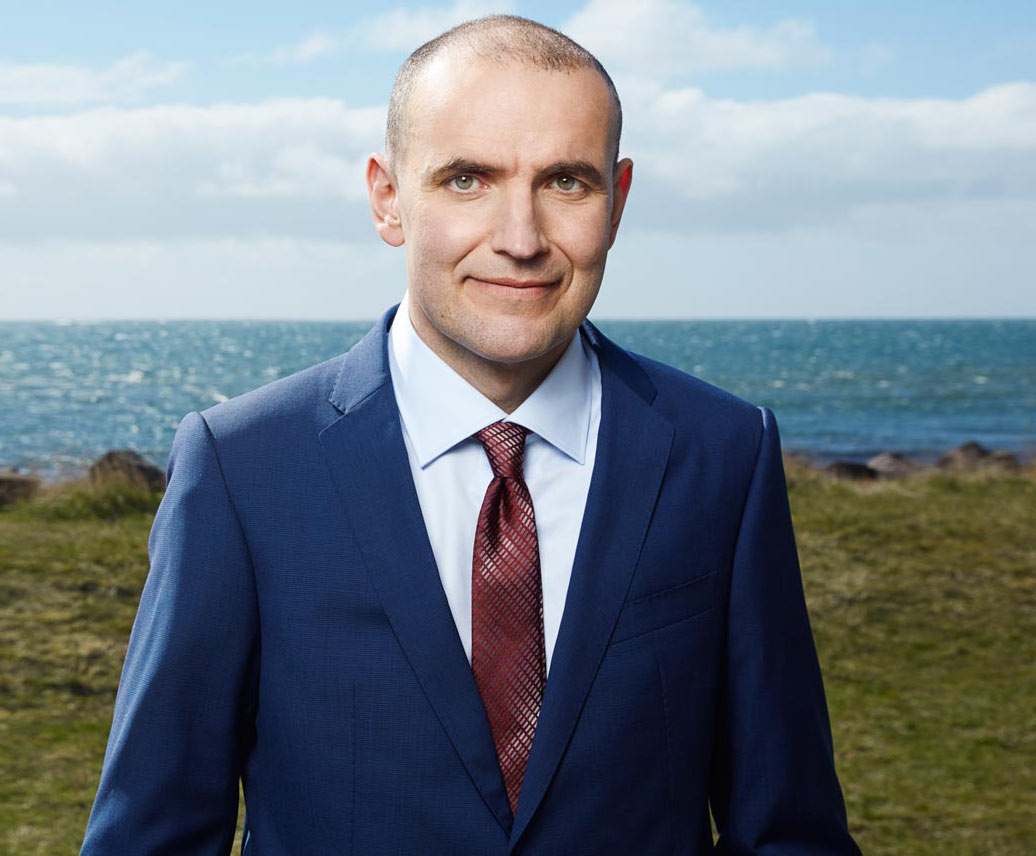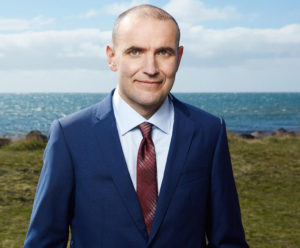



Guðni stands outside organized religion, but was raised in the Catholic faith. He left the Catholic Church due to its delayed and muted response to reports of criminal abuses by priests. His credo is the Universal Declaration of Human Rights, “human beings are born free, equal in dignity and rights. Humans are endowed with reason and conscience and should act in the spirit of brotherhood towards each other.”
Family
Guðni is the son of the teacher and journalist Margrét Thorlacius and the PE teacher and coach Jóhannes Sæmundsson. His father died of cancer at the age of 42. He has two brothers, Patrekur, a former Icelandic national handball team player, who is coach of the Austria national handball team, and Jóhannes, who is a systems analyst.
Guðni married Canadian Eliza Reid in 2004 and they have four children together.The couple, who met while both were studying in the United Kingdom, moved to Iceland in 2003. Reid became First Lady of Iceland when her husband was sworn into office. Guðni also has a daughter from a previous marriage.
Source: https://en.wikipedia.org/wiki/Gu%C3%B0ni_Th._J%C3%B3hannesson
Mr. Grímsson was born in Ísafjörður in Northwest Iceland on 14 May 1943. His parents were Mr. Grímur Kristgeirsson, barber and town councillor in Ísafjörður and Mrs. Svanhildur Ólafsdóttir Hjartar, housewife. Mr. Grímsson was raised in Ísafjörður and also by his grandparents in Þingeyri.
After completing his elementary education, Mr. Grímsson enrolled in the Reykjavík Higher Secondary Grammar School, graduating in 1962. He was involved in extra-curricular activities during his school years and was president of the school’s old debating society, The Future. His path then led him to Manchester University, here he studied Economics and Political Science. He took his BA degree in 1965 in these subjects and five years later, in 1970, took his doctorate in Political Science at the same University. His doctoral research was part of the project “Smaller European Democracies”, directed by the American professor Robert Dahl and the Norwegian professor Stein Rokkan.
Upon returning to Iceland at the end of his studies, Mr. Grímsson was appointed lecturer in Political Science at the University of Iceland, becoming a full professor in 1973. Mr. Grímsson built up the Social Science Department of the University and his main speciality was the evolution of the Icelandic political system. Ólafur Ragnar is the author of many articles and teaching texts on the Icelandic political system, as well as essays on international affairs in numerous periodicals and essay collections.
Mr. Grímsson´s involvement in politics began at an early age. He sat on the board of the Progressive Party’s Youth Federation in the years 1966-1973 and was on the executive board of the Progressive Party from 1971-1973. He first stood for parliament on behalf of the Liberal and Left Alliance in 1974, representing the East part of the country. During that parliamentary session, he twice sat as an alternate member, in 1974 and again in 1975. Mr. Grímsson was chairman of the executive board of the Liberal and Left Alliance from 1974-1975.
In the elections in 1978, Mr. Grímsson was elected to Althingi as a representative for Reykjavik, the capital, for the Peoples’ Alliance Party and again in 1979. He sat in Althingi until 1983 and became chairman of the parliamentary group of the Peoples’ Alliance Party 1980-1983. He served three times as an alternate member representing Reykjavik in the years 1984 and 1985 and four times, representing Reykjanes, in 1987, 1988, 1989 and 1990. Mr. Grímsson was Minister of Finance in the Government of Mr. Steingrímur Hermannsson, 1988-1991. He was re-elected to Althingi representing the Peoples’ Alliance Party in Reykjanes in 1991 and again in 1995.
In 1987, Mr. Grímsson was elected leader of the Peoples’ Alliance Party, a position which he relinquished at the party’s national convention in autumn 1995.
Mr. Grímsson has been a member of various public bodies. He was a member of the Economic Council 1966-1968, on the board of the Icelandic Broadcasting Service 1971-1975, was chairman of a committee concerned with the relocation of public institutions 1972-1975 and chairman of the Icelandic Social Sciences Association, 1975. Mr. Grímsson was vice-chairman of the Icelandic Security Commission from 1979-1990 and sat on the board of the National Power Company from 1983-1988.
Mr. Grímsson was chairman and later International president of the International Association Parliamentarians for Global Action (PGA), in the years 1984-1990 and has sat on the board since. The PGA is an association of over 1,800 parliamentarians in about 80 countries. The association organised the “Six Nations Peace Initiative” 1984-1989, which included amongst others the late premiers Olav Palme of Sweden and Rajiv Ghandi of India. Mr. Grímsson sat on the executive committee of this initiative. He accepted the Indira Gandhi Peace Prize on behalf of the association in 1987 and has himself received international prizes.
Mr. Grímsson was a member of the parliamentary assembly of the Council of Europe 1980-1984 and again in 1995. He was chairman of the organising committee of the “Parliamentary Conference of the Council of Europe, North-South: Europe’s Role 1982-1984”. This conference created the basis for the Council of Europe’s work on North-South relations and the foundation of the North-South Centre in Lisbon. In recent years, Mr. Grímsson has been advisor to Icelandic firms seeking new markets, particularly in Asia and South America.
Mr. Grímsson married Mrs. Guðrún Katrín Þorbergsdóttir in 1974; she died on 12th October 1998. They had twin daughters, Guðrún Tinna and Svanhildur Dalla, born in 1975.
On May 14th 2003 Mr. Grímsson wed Mrs. Dorrit Moussaieff.
Rishi Sunak, Prime Minister of the United Kingdom (since Oct 25, 2022) Rishi Sunak (born…
Giorgia Meloni, Prime Minister of Italy (since Oct 22, 2022) Giorgia Meloni (born 15 January…
Mahamat Déby, President of Chad (since Oct 10, 2022) Mahamat Idriss Déby Itno (born 1…
João Lourenço, President of Angola (sworn in on Sept 26, 2017) Sworn in for his…
William Ruto, President of Kenya (elected on Aug 9, 2022 with 50.5% of the vote)…
Gustavo Petro, President of Colombia (since Aug 7, 2022) Gustavo Francisco Petro Urrego ODB ODSC…
This website uses cookies.
View Comments
how old id this page? has Iceland realy had the same president since in 1996? I thought they had 4 year terms.